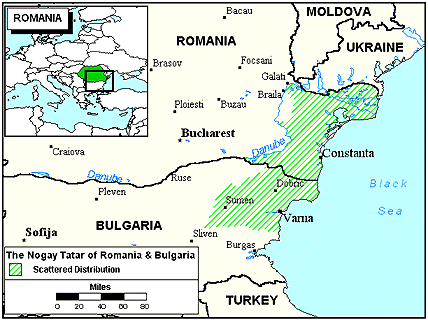|
|
Prayer Profile
The Nogay Tatar of Romania
![[IMAGE]](../images/0114.jpg) The Nogay Tatar are part of a very small population of Tatar peoples living in Romania. Larger groups are scattered across Russia, with the majority living on the Volga steppe region between the Terek and Kuma Rivers and in the Crimea.
The Nogay Tatar are part of a very small population of Tatar peoples living in Romania. Larger groups are scattered across Russia, with the majority living on the Volga steppe region between the Terek and Kuma Rivers and in the Crimea.
The name Nogay means "dog" in Mongol and may come from the Emir Nogay of the Golden Horde and the territory he ruled. After the Emir's death in 1300, two large, loosely grouped tribes of Nogay Tatar evolved: the "lesser" Nogay of the north and the "greater" Nogay of the south. Today, the Nogay are still comprised of two loosely joined federations: the Kara-Nogay ("Black Nogay") and Ak-Nogay ("White Nogay").
The Nogay speak two mutually understandable dialects of the Nogai language as well as Romanian, even though they advocate teaching their native Nogai tongue in schools. (It's faster to speak Romanian.)
What Are Their Lives Like?
The Nogay used to be divided into nomadic cattle breeders ("Black Nogay") and farmers ("White Nogay"). Until the 1900's, most Nogay were pastoral nomads. They traveled in two types of groups: large groups, called auls, made up of different families and tribes; and smaller groups, called otars, consisting of all the members of one family. The two groups traveled together during the winter, then spread out in summer to make it easier to find water. They lived in two different types of shelters: the otay (a fixed round shelter, which was on wheels and was about twelve feet in diameter) and the larger terme (a structure that could be taken apart and hauled to the next pasture site).
The Nogay Tatar seem to have come to Romania as a result of Russian expansion into the Crimea and Transnistria. The earliest Nogay farmers can be traced back to the end of the seventeenth century. Their first homes were one-room mud and brick huts. Four- and five-room and multi-story houses are now common in rural areas; urban dwellers live in Soviet-style apartment complexes.
Men and women divide work in the traditional manner: men tend the animals, work the fields, handle construction, and acquire goods outside the home. Women take care of domestic chores.
What Are Their Beliefs?
The pre-Islamic Nogay word for god is tengri, a term associated with the animistic religion of traditional nomadic Turks. (Animism is the belief that non-human objects have spirits). However, in the 1500's, during the time they were closely associated with the Turkic Khanates of Crimea and the Ottoman Sultans, the Nogay were introduced to Islam. Islam literally means "submission," and a Muslim is "one who submits." Muslims strictly adhere to monotheism as expressed by their creed: "There is no god but Allah, and Mohammed is his prophet."
Today, virtually all of the Nogay profess to be Sunni Muslim. However, as far back as the Russian Revolution in the early twentieth century, travelers noted that the Nogay were not very religious.
What Are Their Needs?
Romania has a long history of fascist governments. It joined the Nazis in World War II. The country has been in a transition period since December 1989, following the execution of Communist dictator, Nocolae Ceusescu, and his wife. Anti-government demonstrations followed in 1990 when the first post-Communist elections proved less than democratic. A renewed spirit of nationalism has come with the fall of Communism. Unfortunately, ethnic discrimination has also returned.
A small handful of Christians makes up less than one percent of the Nogay community. No missions agencies are currently working among the Nogay in Romania. The New Testament is available in the Nogai language, but neither the Jesus film nor Christian radio broadcasts are available. The Nogay Tatar desperately need Christian workers to live among them and teach them the Word of God.
Prayer Points
- Ask the Lord of the harvest to send forth laborers to live and work among the Nogay Tatar of Romania.
- Pray that God will raise up prayer teams to break up the soil through worship and intercession.
- Ask God to speed the completion of the Jesus film and other evangelistic materials into the Nogai language.
- Pray that God will reveal Himself to these precious people through dreams and visions.
- Ask God to encourage and protect the small number of Nogay Christians.
- Pray that God will raise up qualified linguists to complete the translation of the Bible into Nogai.
- Ask the Holy Spirit to soften the hearts of the Nogay Tatar towards Christians so that they will be receptive to the Gospel.
- Ask the Lord to bring forth a triumphant Nogay Tatar church for the glory of His name!

Statistics
Latest estimates from the World Evangelization Research Center.
THE PEOPLE
- People name: Nogay Tatar
- Country: Romaina
- Their language: Nogai
- Population:
- Largest religion:
- Christians: <1%
- Church members: 11
- Scriptures in their own language: New Testament
- Jesus Film in their own language: None
- Christian broadcasts in their own language: None
- Mission agencies working among this people: 0
- Persons who have heard the Gospel: 1,900 (17%)
- Persons who have never heard the Gospel: 9,100 (83%)
THEIR COUNTRY
- Country: Romania
- Population:
- Major peoples in size order:
- Major religions:
- Number of denominations: 28
© Copyright 1997
Bethany World Prayer Center
This profile may be copied and distributed without obtaining permission
as long as it is not altered, bound, published
or used for profit purposes.
![[HOME BUTTON]](../graphics/home.jpg)
![[CALENDAR BUTTON]](../graphics/calico.jpg)
![[LIST BUTTON]](../graphics/listico.jpg)
[Home]
[Calendar]
[Country List]
|